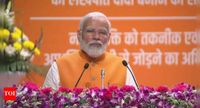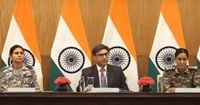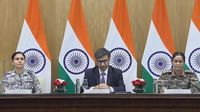As tensions between India and Pakistan escalate, the Indian government has announced the suspension of services for the Kartarpur Sahib Corridor, a significant religious passage for Sikh pilgrims. This decision, announced by Foreign Secretary Vikram Misri during a press briefing on May 9, 2025, is a direct response to the ongoing security scenario resulting from increased hostilities along the border.
Misri stated, "In view of the existing security scenario, the services of the Kartarpur Sahib Corridor have been suspended till further directions." This closure comes just days after India launched 'Operation Sindoor', targeting nine terrorist camps in Pakistan and Pakistan-occupied Kashmir (PoK) as a reaction to the tragic Pahalgam terrorist attack on April 22, which claimed the lives of 26 individuals, including 25 Indian nationals and one Nepali citizen.
The Kartarpur Corridor, which links the Indian town of Dera Baba Nanak to Gurdwara Darbar Sahib in Pakistan, has been a symbol of peace and religious harmony since its inception. However, the recent surge in violence has forced the Indian government to halt pilgrim travel, impacting approximately 150 Sikh devotees who were turned away at the Dera Baba Nanak checkpoint on May 7.
While the corridor remains closed from the Indian side, the Pakistan Sikh Gurdwara Parbandhak Committee (PSGPC) has stated that it continues to accept pilgrims, highlighting the disparity in operational status between the two nations. Ramesh Singh Arora, head of PSGPC, expressed disappointment over the situation, emphasizing that the corridor is open from their side.
The backdrop to this decision is a series of aggressive military actions initiated by Pakistan, which have included drone and missile attacks targeting Indian military installations. Reports indicate that Pakistan employed around 300 to 400 Turkish-made Asisguard Songar drones in these assaults, attempting to infiltrate at 36 different locations across India, including Jammu and Kashmir, Punjab, Rajasthan, and Gujarat.
Colonel Sofiya Qureshi, during a special briefing on the military operations, confirmed that the Indian Armed Forces successfully intercepted many of these drones, neutralizing threats before they could inflict damage. She noted, "Pakistan did not close its airspace on Thursday and allowed civilian aircraft to operate even as it launched Turkish-made drones at India." This tactic, according to Indian officials, was designed to complicate India's defensive response and increase the risk to civilian lives.
In a particularly tragic incident on May 7, a shell fired from Pakistan struck a home adjacent to Christ School in Poonch, resulting in the deaths of two children and injuries to their parents. Misri condemned this act, labeling it a 'new low' for Pakistan, which has been accused of deliberately targeting places of worship and civilian areas.
Following the escalation of hostilities, Indian Prime Minister Narendra Modi convened a meeting with former service chiefs and veterans to discuss the current security situation. This meeting underscored the seriousness with which the Indian government is treating the threat from Pakistan, particularly in light of the recent military operations.
Operation Sindoor, launched on May 7, has been described as one of India’s most significant military operations since 1971. It involved precision strikes on terror camps associated with groups such as Jaish-e-Mohammed, Lashkar-e-Taiba, and Hizbul Mujahideen, located in both Pakistan and PoK. The operation was a direct response to the Pahalgam attack, and reports suggest that it resulted in the deaths of over 100 terrorists.
India's response to Pakistan's accusations of targeting its own cities has been firm. Misri dismissed these claims as a "deranged fantasy" that only Pakistan could conjure, stating, "Instead of owning up to its actions, Pakistan made the preposterous and outrageous claims that it is the Indian armed forces that are targeting its own cities like Amritsar and trying to blame Pakistan."
As the situation unfolds, heightened security measures are being implemented across India, particularly in border areas. The Border Security Force (BSF) has reported successful thwarting of infiltration attempts, including the killing of at least seven terrorists during a bid along the International Boundary in Samba district on the night of May 8.
The ongoing tensions have also prompted international discussions. External Affairs Minister S. Jaishankar has engaged in conversations with global leaders, including US Secretary of State Marco Rubio, emphasizing India’s commitment to counter-terrorism and the necessity for a zero-tolerance policy against such threats.
As the conflict continues to escalate, the Indian government remains vigilant, with Defence Minister Rajnath Singh conducting reviews of national security and operational readiness. The Indian Armed Forces are prepared to respond decisively to any further provocations from Pakistan, ensuring the safety and sovereignty of the nation.
In light of these developments, the Indian populace is being advised to remain alert, with air raid sirens sounding in several regions as a precautionary measure. The government has also suspended leave for city employees in Delhi and heightened security at airports, reflecting the seriousness of the current security landscape.
The suspension of the Kartarpur Corridor serves as a stark reminder of the fragile peace that exists between India and Pakistan. As both nations navigate this complex situation, the hope remains that dialogue and diplomacy will prevail over conflict.



